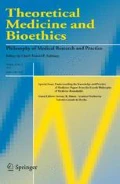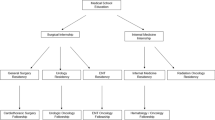Abstract
As health care embraces the tenets of evidence-based medicine it is important to ask questions about how evidence is produced and interpreted. This essay explores normative dimensions of evidence production, particularly around issues of setting the tolerable level of uncertainty of results. Four specific aspects are explored: what health care providers know about statistics, why alpha levels have been set at 0.05, the role of randomization in the generation of sufficient grounds of belief, and the role of observational studies. The essay concludes with recommendations to acknowledge the value permeation of outcome measures and suggests that attention to reasoning and argument analysis can augment traditional evidence-based approaches in providing a robust critical approach to medical knowledge.
Similar content being viewed by others
References
Fisher RA. Statistical Methods and Scientific Inference, 3rd edn. New York: Hafner Press, 1973, p. 50.
Fisher RA. Op. cit., 1973 p. 45.
Mike V. Outcomes research and the quality of health care: The beacon of an ethics of evidence. Eval Health Prof 1999; 22: 3–32. See the Levels of Evidence and Grades of Recommendation at Evidence Based Medicine, http://cebm.jr2.ac.uk/ docs/levels.html.
Pellegrino E. The ethical use of evidence in biomedicine. Eval Health Prof 1999; 22: 33–43.
Wulff HR, Andersen B, Brandendorff P, Guttler F. What do doctors know about statistics? Stat Med 1986; 6: 3–10.
Reid MC, Lane DA, Feinstein AR. Academic calculations versus clinical judgments: Practicing physicians' use of quantitative measures of test accuracy. Am J Med 1998; 104: 374–380.
Burton P. Helping doctors to draw appropriate inferences fromthe analysis of medical studies. Stat Med 1994; 13: 1699–1713.
Naylor CD, Chen E, Strauss B. Measured enthusiasm: does the method of reporting trial results alter perceptions of therapeutic effectiveness? Ann Intern Med 1992; 117: 916–921.
Fahey T, Griffiths S, Peters TJ. Evidence based purchasing: Understanding results of clinical trials and systematic reviews. BMJ 1995; 311: 1056–1060.
Feinstein AR. “Clinical Judgement” revisited: The distraction of quantitative models. Ann Intern Med 1994; 120: 799–805.
Walter SD. Methods of reporting statistical results from medical research studies. Am J Epidemiol 1995; 141: 896–906.
Sterne JAC. Smith GD. Sifting the evidence - what's wrong with significance tests? BMJ 2001; 322: 226–231.
Altman DG, Statistics in medical journals: Developments in the 1980's. Stat Med 1991; 10: 1897–1913.
Guyatt G, Jaeschke R, Heddle N, Cook D, Shannon H, Walter S. Basic statistics for clinicians: 1. Hypothesis testing. CMAJ 1995; 152: 27–32.
Salsburg DS. The religion of statistics as practised in medical journals. The American Statistician 1985; 39: 220–223J.
Upshur R. Priors and prejudice. Theor Med Bioech 1999; 20: 319–327.
Salsburg DS. The use of statistical methods in the analysis of clinical studies. J Clin Epidemiol 1993; 46: 7–27.
Salsburg DS. Op. cit., p. 26.
Brant R, Sutherland L, Hilsden R. Examining the minimum important difference. Stat Med 1999; 18: 2593–2603.
Feinstein AR. Clinametrics. New Haven: Yale University Press, 1987.
Feinstein AR. What can clinicians contribute to mutual challenges in medical statistics? J Clin Epidemiol 1999; 52: 365–369.
Feinstein AR. P-values and confidence intervals: Two sides of the same unsatisfactory coin. J Clin Epidemiol 1998; 51: 355–360.
Matthews JR. Quantification and the Quest for Medical Certainty. Princeton: Princeton University Press, 1995.
Cartwright N. Nature's Capacities and TheirMeasurement. Oxford: Clarendon Press, 1989, p. 92.
Cox DR (Response to Schaffner K). Clinical trials and causation: Bayesian perspectives. Stat Med 1993; 12: 1495.
Cartwright N. Op. cit., 1989, p. 104.
Feinstein AR. Op. cit., 1994, p. 802.
Urbach P. The role of randomization and control in clinical trials. Stat Med 1993; 12: 1421–1431.
Weed DL. Underdetermination and incommensurability in contemporary epidemiology. Kennedy Inst Ethics J 1997; 7: 107–127.
Weed DL. Epidemiologic evidence and causal inference. Hematol Oncol Clin North Am 2000; 14: 797–807.
Greenland S. Randomization, statistics, and causal inference. Epidemiology 1990; 1: 421–429.
Brennan P, Croft P. Interpreting the results of observational research: Chance is not such a fine thing. BMJ 1994; 309: 727–730. See for example Poovey M. A History of the Modern Fact: Problems of Knowledge in the Sciences of Wealth and Society. Chicago: University of Chicago Press, 1988.
Toulmin S. The Uses of Argument. Cambridge: Cambridge University Press, 1958.
Dickinson H. Evidence-based decision-making: An argumentative approach. Int J Med Inf 1998; 51: 71–81.
Horton R. The grammar of interpretive medicine. CMAJ 1998; 159: 245–249.
Horton R. Op. cit., 1998, p. 245.
Walton D. The New Dialectic: Conversational Contexts of Argument. Toronto: University of Toronto Press, 1998.
Upshur R. Certainty, probability and abduction: Why we should look to CS Peirce rather than Godel for a theory of clinical reasoning. J Eval Clin Pract 1997; 3: 201–206.
Upshur REG. Seven characteristics of medical evidence. J Eval Clin Pract 2000; 6: 23–27.
Wulff HR. The two cultures of medicine: Objective facts versus subjectivity and values. J R Soc Med 1999; 92: 549–552.
Author information
Authors and Affiliations
Rights and permissions
About this article
Cite this article
Upshur, R. The Ethics of Alpha: Reflections on Statistics, Evidence and Values in Medicine. Theor Med Bioeth 22, 565–576 (2001). https://doi.org/10.1023/A:1014462116530
Issue Date:
DOI: https://doi.org/10.1023/A:1014462116530




